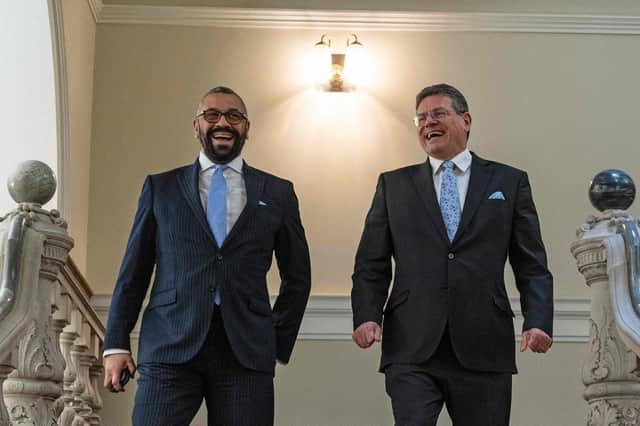Ben Lowry: It has been a winding and complex route to defeat for unionists over the Irish Sea border at the hands of other MPs


(Scroll down for links to letters by Kate Hoey, Nigel Dodds, an article by the haulier Paul Jackson and other recent articles by Ben Lowry)
James Cleverly and Maroš Šefčovič formally ratified the UK-EU deal over Northern Ireland after what they described as “the successful vote in the House of Commons on the Stormont Brake”. An extraordinary moment in Northern Ireland history has been closed in which the province was at the heart of a dispute between the United Kingdom and the European Union that has lasted the better part of seven years.
Advertisement
Hide AdAdvertisement
Hide AdPeople around the world who had barely heard of Northern Ireland and who might only have a passing interest in politics will have been vaguely aware that NI was at the heart of a running dispute as complex as the Schleswig-Holstein dispute in a part of Denmark in the 1800s.
There is a line famously attributed to the British statesman Lord Palmerston: “Only three people have ever really understood the Schleswig-Holstein business: the Prince Consort, who is dead; a German professor, who has gone mad; and I, who have forgotten all about it.”
At times I think only about three people have properly understood the Northern Ireland Protocol – and I cannot claim to be one of them.
The current unionist political malaise has its origins in the fact that very few people have understood the Irish Sea border. Until 2016 barely anyone had to think hard about matters such as the difference between the customs union (tariffs) and single market (regulations).
Advertisement
Hide AdAdvertisement
Hide AdAnd even when people get their heads round that, barely anyone is a trade expert and barely anyone is a constitutional lawyer. Therefore, the UK thinking as to what to do with the border(s) question was confused from 2016, let alone the unionist thinking (given that unionism is of course a much smaller pool of people).
Hence you have seen, all the way back to 2016, unionism generally lurching one way, then the other. For example, not long after the Brexit vote there was talk of NI getting the ‘best of both worlds’ and there was a lot of unionist interest in this idea, in much the same way that there was a lot of interest in the idea of NI having a different rate of corporation tax to the rest of the UK. I only remember Jim Allister KC raising concerns about the implications of such tax divergence from Great Britain.
Now we see that there is no such thing as best of both worlds. You are either in the UK internal market or the EU single market, and we are in the latter. This is not to deny that London, and others, have tried hard to alleviate some of the symptoms of that abnormal arrangement (ie alleviate checks in the Irish Sea), but to point out that, as some hauliers have explained, there is still a major internal UK barrier (the web version of this article links to an essay we ran yesterday from Paul Jackson, such a haulier who thinks that the border will be irreversible and indeed that it will reinforce the protocol, see below). But unionists sent out mixed signals about EU access right to the end, which was noticed in Brussels and elsewhere (and which comes with consequences for GB trade).
Some informed people in London say that Rishi Sunak has become hardened to unionist opposition, that he did what he could to recover from a position in which Theresa May left them 5-0 down, when she conceded that there would be no trade barrier whatsoever at the Irish land border, that the Stormont brake is meaningful and a huge UK triumph. I think the back story is more complicated than that, involving a range of actors including the Brexit vote itself (a highly perilous venture from a unionist perspective), Mrs May conceding too much and Boris Johnson’s sudden (and, in light of his pledges, flagrant) capitulation to the EU in late 2019.
Advertisement
Hide AdAdvertisement
Hide AdBut regardless of the various factors that have brought us to unionist disaster, I still think that unionists cannot accept such an internal frontier. If they did, then the question would arise: what is unionism? There is certainly an argument for NI to be a hybrid between rest of UK and the Republic of Ireland. But it is an argument for groups such as the Alliance Party, which is agnostic on the Union.
On Wednesday, the Commons divided 515 to 29 in favour of the Framework. In 1985, the Anglo Irish Agreement was passed by MPs 473 to 47, but the opposition numbers were higher then because hard left Labour MPs opposed the deal too.
This is a very bad situation and gives the many people who cherish the Union a lot to think about in the coming months.
Ben Lowry (@BenLowry2) is News Letter editor. Other articles by him below
Advertisement
Hide AdAdvertisement
Hide AdHaulier Paul Jackson: Far from getting rid of the Irish Sea border, the Windsor Framework reinforces it
Nigel Dodds: It turns out the Stormont brake is unworkable
Ben Lowry March 18: Hauliers have helped harden some unionist politicians against deal
Advertisement
Hide AdAdvertisement
Hide AdBen Lowry March 11: Unionists have not been alone in not wanting SF at the helm
Ben Lowry March 4: Unionist choice on deal is between two disasters